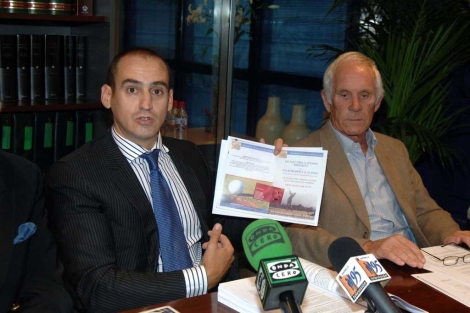El despacho de abogados Lawbird, ha presentado una querella criminal ante la Audiencia Nacional contra diez bancos internacionales por delitos de estafa y defraudación contra la Hacienda pública, de las que han sido víctimas unas ochocientas personas en España.
El abogado del despacho Lawbird, ubicado en Marbella (Málaga), Antonio Flores Vila, ha dado a conocer hoy en conferencia de prensa la querella interpuesta el pasado 6 de noviembre, junto con el presidente de la Asociación de Víctimas de la Hipoteca Inversa Extranjera, Evan Armstrong, y el vicepresidente, Ian Sherdley.
El letrado ha manifestado que su despacho atiende a “veinticinco clientes” por este tema, aunque cree que podría haber unos 800 afectados que “intentan negociar con el banco”.
Los bancos querellados son diez, ocho de origen escandinavo, entre los que se encuentran Danske Bank, Nordea Bank, Lex Life & Pension, Landsbanki, Jyske Bank, Finansbanken,Nykredit, Sydbank, uno de procedencia británica, N M Rothschild & Sons, y otro de nacionalidad suiza, Swiss Life.
Las presuntas infracciones que se le imputan a estas entidades bancarias son delitos continuados de publicidad engañosa, estafa, defraudación contra la hacienda pública, y falsedad ideológica en documento público.
Trama desde 2004
Según ha explicado Flores, la trama se origina en el año 2004 entre bancos extranjeros a través de una “red de agentes financieros” que desplegaron una “campaña de captación de recursos” en la Costa del Sol, que tenía como objetivo a extranjeros con viviendas sin hipoteca con “cierta capacidad económica” y “sin mucha liquidez”, principalmente pensionistas.
El presunto delito consiste en ofertar a los clientes un producto conocido como “hipoteca inversa”, una simulación donde se “traban hipotecas” en viviendas ya pagadas o sin hipotecar para ceder préstamos a los clientes que son “llevados a paraísos fiscales”, principalmente Luxemburgo.
“Te venden un producto diciéndote que es asistencial, cuando es absolutamente especulativo, además te lo venden con la excusa necesaria de que te vas a ahorrar los impuestos, que los impuestos españoles son tan caros, que si no haces algo, vas a perder tu vivienda”, ha destacado Flores.
Fraude a Hacienda
“Por el número de personas defraudadas, el importe medio de las viviendas es de doscientos cincuenta millones de euros en dinero que se ha detraído de las viviendas de los extranjeros”, ha asegurado el jurista. Por otro lado, Flores ha declarado que el importe medio de defraudación a la Hacienda pública se calcula en torno a “cincuenta y setenta y cinco millones de euros”.
El dinero de las víctimas se destinaba a inversiones en mercados financieros que han derivado en bonos japoneses, coronas checas, francos suizos, en monedas, en divisas, bonos de otros bancos_, ha asegurado el letrado, donde los clientes “lo han perdido todo”.
Flores ha señalado que la hipoteca inversa española es un producto asistencial destinado a la tercera edad que permite generar ingresos a través de dos vías, la pensión vitalicia, donde el cliente vende su casa al banco y percibe a cambio una paga mensual, y la hipoteca inversa, con la que la entidad da un préstamo que es garantizado con una hipoteca.
La diferencia entre estos servicios bancarios y los ofertados por las entidades querelladas consiste en que “no pueden echarte de tu casa” y que el dinero obtenido “no se invierte para especular en el mercado”.
-
BÚSQUEDAS RELACIONADAS

 El abogado Antonio Flores junto a uno de los afectados por la estafa. | Javier Martín
El abogado Antonio Flores junto a uno de los afectados por la estafa. | Javier Martín
 An expat is taking Denmark’s biggest bank to court after it persuaded him to use his Spanish property as collateral in an equity release scheme – and cost him his home. Scot Euan Armstrong, 73, is fighting every step of the way after the scheme left him almost penniless with the bank trying to force him to sell his two million euro home to pay off debts.
An expat is taking Denmark’s biggest bank to court after it persuaded him to use his Spanish property as collateral in an equity release scheme – and cost him his home. Scot Euan Armstrong, 73, is fighting every step of the way after the scheme left him almost penniless with the bank trying to force him to sell his two million euro home to pay off debts.